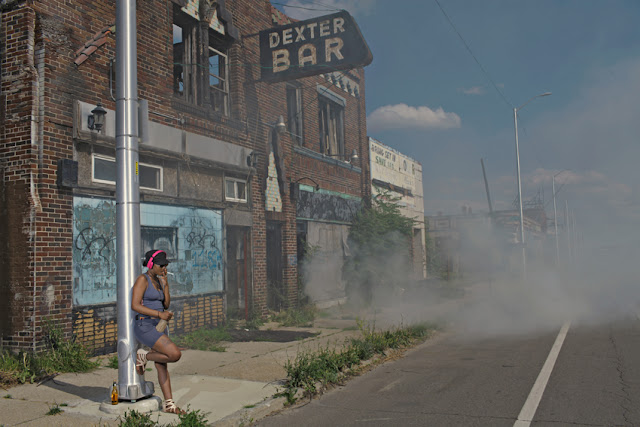Detroiters consider how the 1967 riots continue to affect the city's people and landscape. The project was commissioned by Detroit – a new film from Academy Award winners Kathryn Bigelow and Mark Boal.
__________
“The long-lasting impact is a lack of unity and black-owned businesses”
- Shana Hubbard, resident of the riot-affected Dexter/Elmhurst neighborhood. Full interview: https://youtu.be/UbT6u6mtfLw.
Photographer's note: More than 1,000 homes and businesses were destroyed in the '67 riots. Many more would fall as a consequence of post-riot disinvestment. As far as the story I want to tell with this series is concerned, these structures are as important as the subjects. The buildings were easy to find. Subjects were not. I was on deadline. I decided to stake out this particular building and hope a subject would come along. And come along she did. Not only was Shana photogenic with an innate feel for posing and narrative, her hot pink headphones were a perfect complement to the building's cyan blue. Shana and I talked about hopes, dreams, and how hard it can be to escape the circumstances we are born into. I hope Shana is doing well.
____________________________
“I don’t quite understand how we tear down our own, cause we have to live with it for the next 30, 40 years.”
- Baltimore Gallery curator and Smile Brand owner Phil Simpson. Full interview: https://youtu.be/vaeBCGnaFZU.
Photographer's note: I started doing The People of Detroit as a way of self-medicating. I have severe chronic misanthropy. By forcing myself to go out with my camera and meet strangers, it was only a matter of time before I met a stranger who would convince me pandemics are a bad thing afterall. Phil was just that kind of person. Ironically, I photographed the Smile merchant on the day after he lost his keys. He was still as gracious as ever. To me, artistic entrepreneurs like Phil represents hope for Detroit's future. Not everyone in Detroit is an abandoned building.
____________________________
“In a way, maybe the guy [stealing a color TV is fighting oppression]”
- Quan Neloms, teacher at the Frederick Douglass Academy for Young Men in Detroit. Quan and his son Mathias were photographed at the site of the now-demolished Algiers Motel. During the riots, three black men were killed in the motel by white police officers. Full interview: https://youtu.be/CrBJVrNZSXk.
Photographer's note: I just happened to meet Quan while I was doing a lighting test at this location. The person I did the lighting test for was unable to make it. I happened to see Quan again later that week in Whole Foods. He had on the shirt featuring years when riots happened. Perfect. Quan and I disagree vehemently about the ultimate impact and characterization of the riots. When one person steals one TV, it's theft. When 100 people steal 100 TVs it's still theft. The fact lots of thefts occur simultaneously does not transmute theft into rebellion. That said, I'm glad Quan and his son Mathias were nice enough participate in project. Quan has a voice that needs to be heard.
____________________________
“The riots signaled the African-American community was not going to tolerate segregation.”
- Writer and Kresge Artist Fellow Marsha Music. She was photographed in the empty lot where her father's record store once stood. The store was destroyed as a consequence of the riot. Full interview: https://goo.gl/Tewnx4
Photographer's note: I think language is important. Specific words describe specific things in reality. We should match words with the reality they describe. I am persuaded by the late University of Michigan history professor Sidney Fine's contention that the events of 1967 do not match the word "rebellion." From his book “Violence in the Motor City”:
“Those involved in the disturbance in Detroit can hardly be described as having been engaged in ‘organized armed resistance to an established government,’ as rebellion is commonly defined.”
That said, Marsha is wonderfully articulate. When I started this project, I knew I had to include her voice.
____________________________
“We lost a lot of businesses and homes. [The riots] had a negative impact on the black race.”
- Fiat Chrysler Automobiles employee Sonya Reese. Sonya and her daughter Ivy were interviewed and photographed in Gordon Playground. The playground was built on the site of the blind pig where the 1967 riot began. The park was remodeled in June 2017. The park is located on the precipice of prosperity. To the east are the mansions of the beautiful Boston-Edison historic district. To the west is the Dexter Bar. Full interview: https://youtu.be/E9czKO5piRk.
Photographer's note: When I came up with the question, "What do you think is the long-lasting impact of the riots?" I was sure I'd created a trapdoor into an inescapable rhetorical steel cage. I was surprised to hear some people argue the riot was inconsequential – or even more remarkable – a good thing. I tend to agree with Sonya. Riots destroy businesses and homes in a community that was already marginalized. It's hard to imagine how this could possibly be a net positive. That said, I am happy to have stumbled across dissent. I think we are all best served when our assumptions are challenged.
Final note: I'd like to thank everyone at Annapurna Pictures for trusting me with this fantastic project. I can only hope it is a modicum as powerful as the film for which it was created. If you haven't already, go see Detroit.










No comments:
Post a Comment